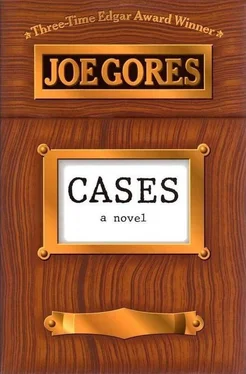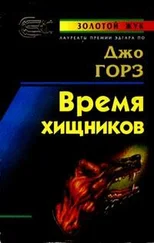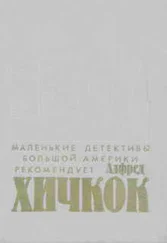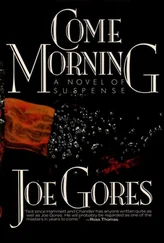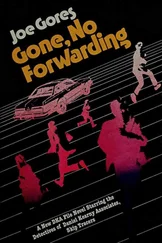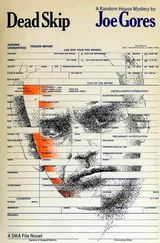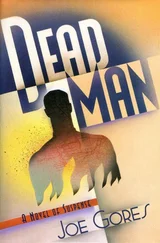The only thing wider than Craven’s yellow streak was his mean streak. He looked like his name, jockey-sized, with greasy black hair parted in the middle so it hung down on either side of his thin face like an upside-down horseshoe. His small, nasty, close-set eyes, always on the move, flanked a nose that twitched often, like a rabbit’s smelling out danger. Or an illicit buck.
He was sitting on a stack of two-by-sixes in a corrugated tin shed where Giotti Construction was putting in endless row houses overlooking Skyline Boulevard in Daly City. As he bit into his sandwich, a small, surprisingly powerful hand closed around his shoulder. Craven jerked free indignantly.
“You ain’t with the cops no more, you got no right comin’ around hasslin’ me.”
Drinker Cope said with his big red-faced insincere grin, “Who got you this cushy job here with Giotti Construction?”
“Yeah, well, you had your reasons,” said Craven darkly.
“I’m glad you brought that up. Dynamite. Four sticks. The usual accessories to go with it — you know what I need. Electrical blasting cap, insulated wire, a crimper — just short inventory a bit, you’ve done it before. There’s even a few bucks in it for you.”
Greed made Craven’s nose twitch. “It’s my job if I get caught. I oughta get at least—”
The hand was macerating the shoulder again. “Remember that Ivory soap slogan? ‘It floats’? You say anything to anybody, anybody, y’understand, ever, and you’re Ivory soap.” Drinker got to his feet. “Floating facedown in the Bay in among all those assholes from the Polar Club, as in a corpse. You got a week.”
Craven watched the big, deceptively graceful man go across the raw earth toward his car. Could he profit from the knowledge that Drinker Cope wanted dynamite and detonators? No. If Cope was a diamond, he’d be the diamond used to cut other diamonds.
In Daly City Drinker had a beer and beat himself at shuffleboard. After two hours at the Buena Vista last night with Harry Wham, he still didn’t know if Harry was the marine captain who had saved his life.
He’d have to make up his mind soon — the dynamite was on its way and April was a dangerous obsession, becoming daily more compelling. But he had a pretty good hunch she wouldn’t dump him afterward. Besner was a lightweight, couldn’t go the distance. But Drinker wanted to be sure. One easy way to find out.
If Dunc found that Harry was innocent enough to actually be looking for a galleon up at Point Arena, it might make a difference in Drinker’s decision.
The assignment sheet read: BEN McKINNEY, 26, married. The only address was P.O. Box 174A, Point Arena.
Point Arena, in the fading light, was a small fishing community clinging to a broad sweep of hillside going down to the sea. Dunc got there at 5:12 P.M. The post office had officially closed at five, but there were lights on inside, a radio was playing, the American flag hung wetly from the flagpole. But nobody would answer his pounding on the door. Un-civil servants.
At his third gas station a teenager with big red knobby hands and a Uriah Heep Adam’s apple pointed through the rain.
“You drive down there a mile or so, you’ll find a wharf. Take the road leads off between two for them warehouses to the Standard Oil Bulk Plant. Mr. McKinney lives off to the right of the bulk plant, there, up on the hillside. Second house up.”
Dunc pulled into the driveway of the second house on a steep gravel road going up the hillside across from the bulk plant. The smell of crude filled the wet air. There were lights in the windows. He went up on the wooden porch and knocked. The rain was slacking off. The opened door spilled out yellow light.
A slight, bent, snuff-chawing man peered up at Dunc from beneath shaggy white eyebrows. He was bald as a boiled egg.
“Ben McKinney?” asked Dunc.
A head shake. “Nope. Father. Ain’t it a shame?”
“Sure is. Is your son home?”
“Nope.” Head shake. “Left for Santa Rosa five hours ago. Him and his wife. Ain’t it a shame?”
“Sure is,” said Dunc. “Will he be back tonight?”
“Can’t say for sure. Ain’t it a shame? Young Willem he drank some diesel oil, he’s in the hospital there. Seven months old.” A nod. “Yep. Musta thought it was milk.”
“Is the boy okay?” asked Dunc.
A nod. “Must be — hospital’s lettin’ him come home.”
Come back later. But as he was turning back into the street past the bulk plant, a 1949 brown De Soto Club Coupe was turning in. A man and woman in the front seat, a kid of maybe five or six in the back. The driver was a lean open-faced man with worried eyes. Dunc stopped and rolled down his window.
“Mr. McKinney? How’s your boy?”
The woman put her face in her hands.
McKinney said, “They thought he was all right, but then he got pneumonia and the whooping cough, thanks for asking.”
“Gosh, this is a terrible time, but do you think you could give me five or ten minutes for some questions?”
McKinney looked over at his wife, then shrugged.
“Come up to the house. We gotta pack a few things anyway.”
Ben McKinney’s wife, Marilyn, had been in the hospital at Santa Rosa having their little boy Willem, now on the edge of death, on the very night that Drinker’s client had been run down in a Petaluma street after bar-close by the man he was suing. McKinney’s car? He had lent it to his brother, now lived in Texas, he had the address around here somewheres...
Dunc handwrote a statement for him to sign, which he did with the father signing as a witness, got the brother’s address in Houston, and left them to their sorrow.
He found himself pulling for the little kid as he went systematically through Point Arena with a new set of questions: Did anyone know a yachtsman named Harry Wham? Well, then maybe a power cruiser called the Doubloon? How about a big blond guy who was followed around by a small quick Chinese kid?
He talked with fishermen, grocery clerks, gas-pumpers, a used-car salesman, two old women at the five-and-dime, the hotel clerk, the town’s only motel owner, bartenders, store clerks, the town librarian, a sheriff’s deputy, and two volunteer firemen.
If Harry had left footprints — or keel marks — in Point Arena, Dunc couldn’t find them. On the long drive home he had things to think about other than his own impending marriage.
A maybe dying baby. How a private eye seldom got the whole story on anything. Would Julia Demchuk get a divorce? Who had put Chauncey Jones in a Colma cemetery plot? What wasn’t Drinker telling him about the Harry Wham investigation? Who was their client in the search for Kata Koltai that ended in two murders?
Stories without climaxes. Now, if he were writing these cases as fiction... Maybe he should try some private-eye tales. He sure had enough background material...
Penny, emotionally and physically exhausted, woke to the voice of the stewardess over the cabin’s loudspeaker system. “...beginning our descent into San Francisco. Please extinguish all smoking materials and bring your seat backs and tray tables to their upright and locked positions...”
There was a shuddering rumble as the wheels were lowered. Penny shivered. She was scared. Did Dunc still love her now that she was... with child? The grandmotherly woman beside her leaned over to ask if she lived in San Francisco.
“I’m coming out to get married,” she said, suddenly proud.
But what if Dunc had changed his mind? When she had been out here for New Year’s, she had noticed changes in him. He was harder, not so naive, not so open. Detective work seemed to be making him cynical and tough.
Look at Drinker Cope. Look at Sherry. Hard and flip on the surface, but hopelessly in love with Drinker — who wasn’t in love with her. Both women had known it without ever speaking of it. Dunc hadn’t. Men did not understand.
Читать дальше
